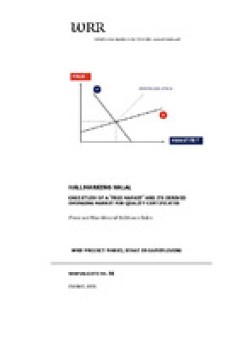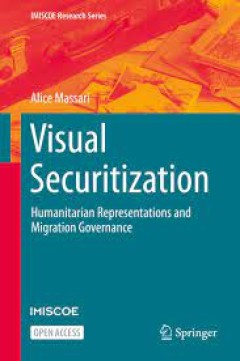Filter by

The "Democratic Soldier": Comparing Concepts and Practices in Europe
Since the end of the Cold War almost all European countries have reformed their armed forces, focusing on downsizing, internationalization and professionalization. This paper examines how these changes in security sector governance have affected the normative model underlying the militaryâ s relationship to democracy, using the image of the â democratic soldierâ . Drawing on a comparative an…
- Edition
- Ed. 1
- ISBN/ISSN
- 9781911529361
- Collation
- 64
- Series Title
- SSR Papers, 9
- Call Number
- 320 MAN d

Comparative Federalism and Covid-19: Combating the Pandemic
This comprehensive scholarly book on comparative federalism and the Covid-19 pandemic is written by some of the world’s leading federal scholars and national experts. The Covid-19 pandemic presented an unprecedented emergency for countries worldwide, including all those with a federal or hybrid-federal system of government, which account for more than 40 per cent of the world’s population. …
- Edition
- -
- ISBN/ISSN
- 9781000471311
- Collation
- -
- Series Title
- -
- Call Number
- -

Complexity, Security and Civil Society in East Asia: Foreign Policies and the…
Complexity, Security and Civil Society in East Asia offers the latest understanding of complex global problems including nuclear weapons, urban insecurity, energy, and climate change in the region. Detailed case studies in China, North and South Korea, and Japan demonstrate the importance of civil society and 'civic diplomacy' in reaching shared solutions to these problems in East Asia and beyo…
- Edition
- Ed. 1
- ISBN/ISSN
- 9781783741120
- Collation
- 470
- Series Title
- -
- Call Number
- 320 COM c

Hallmarking Halal - 56
De opdracht voor deze tekst is gegeven door de projectgroep Markt, staat en samenleving van de WRR. Een aantal externe auteurs werd gevraagd in detail te beschrijven hoe het afstemmingsproces van vraag en aanbod in praktijk werkt. In tegenstelling tot de theorie, vraag en aanbod, prijs en kwaliteit gebeuren niet automatisch; dit werpt een tweede vraag op, namelijk welke rol de overheid in dit p…
- Edition
- -
- ISBN/ISSN
- -
- Collation
- -
- Series Title
- -
- Call Number
- -

Cultures of Solitude Loneliness – Limitation – Liberation
This collection of essays comprises cultural analyses of practices of eremitism and reclusiveness in the USA, which are inseparably linked to the American ideals of individualism and freedom. Covering a time frame from the eighteenth to the twenty-first century, the essays study cultural products such as novels, poems, plays, songs, paintings, television shows, films, and social media, which re…
- Edition
- -
- ISBN/ISSN
- -
- Collation
- -
- Series Title
- -
- Call Number
- -

Towards an International Code of Conduct for Private Security Providers: A Vi…
The use of private security companies (PSCs) to perform services that are traditionally associated with the state presents a challenge to regulatory and oversight frameworks. Analyzing developments leading to the International Code of Conduct for Security Providers (ICOC) and the ICOC Association, this paper argues that a multistakeholder approach to develop standards adapted for the private se…
- Edition
- Ed. 1
- ISBN/ISSN
- 9781911529392
- Collation
- 61
- Series Title
- SSR Papers, 12
- Call Number
- 320 BUZ t

First Nationalism Then Identity: On Bosnian Muslims and Their Bosniak Identity
First Nationalism Then Identity focuses on the case of Bosnian Muslims, a rare historic instance of a new nation emerging. Although for Bosnian Muslims the process of national emergence and the assertion of a new salient identity have been going on for over two decades, Mirsad Kriještorac is the first to explain the significance of the whole process and how the adoption of their new Bosniak id…
- Edition
- -
- ISBN/ISSN
- 9780472075508
- Collation
- -
- Series Title
- -
- Call Number
- -

Youth-Led Social Movements and Peacebuilding in Africa
This book critically examines and analyses the active role played by youth-led social movements in pushing for change and promoting peacebuilding in Africa, and their long-term impacts on society. Africa’s history is characterised by youth movements. The continent’s youth populations played pivotal roles in the campaign against colonialism and, ever since independence, Africa’s youth have…
- Edition
- -
- ISBN/ISSN
- 9781000614053
- Collation
- -
- Series Title
- -
- Call Number
- -

Visual Securitization Humanitarian Representations and Migration Governance
This open access book offers an innovative account of how relief organizations’ visual depiction of Syrian displacement contributes to reproduce and reinforce a securitized account of refugees. Through visual analysis, the book demonstrates how the securitization process takes place in three different ways. First of all, even if marginally, it occurs through the reproduction of mainstream med…
- Edition
- -
- ISBN/ISSN
- 9783030711436
- Collation
- -
- Series Title
- -
- Call Number
- -

Uma politics; An ethnography of democratization in West Sumba, Indonesia, 198…
Democracy cannot be implemented overnight. Democratization is an often unpredictable process. This book concentrates on that political transformation in one of Indonesia’s most ‘traditional’ islands, Sumba. Why does democratization create such great opportunities for local politicians with their private agenda’s? Why does regional autonomy, as part of the national democratization progra…
- Edition
- -
- ISBN/ISSN
- 9789004253926
- Collation
- -
- Series Title
- -
- Call Number
- -
 Computer Science, Information & General Works
Computer Science, Information & General Works  Philosophy & Psychology
Philosophy & Psychology  Religion
Religion  Social Sciences
Social Sciences  Language
Language  Pure Science
Pure Science  Applied Sciences
Applied Sciences  Art & Recreation
Art & Recreation  Literature
Literature  History & Geography
History & Geography